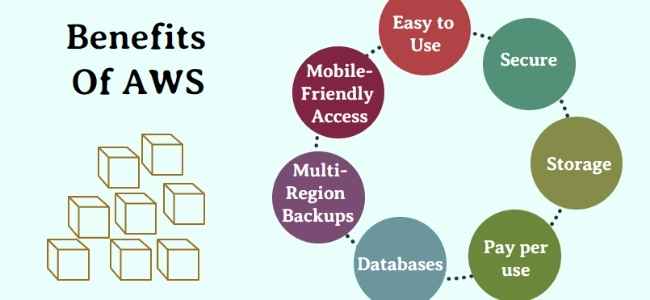In this blog let us discuss some key benefits of AWS:
- Cost-effective: AWS is known as one of the most effective cloud platforms in the market. It is suitable for big organizations for their complex operations. It is suitable for small organizations for their less complex operations.AWS offers a Pay-as-you-go option for their customers. This means the customers need to pay for the services they have used based on their consumption time. AWS also offers many features for saving money like AWS cost-management console. This helps determine the cost and also shows us the saving plans. We can also maintain budget plans which give an alert message when we cross our budget.
- Easy-to-use: AWS an easy-to-use platform. In this, we can easily set up our cloud environment using AWS console which offers multiple types of servers. If we make a comparison with the traditional method, we need to set up our own servers for storing data which consumes a lot of money. If we want to scale the resources we also need to spend a lot of money and effort. But using AWS we can create our required resources with just some clicks. We can scale up and down according to our requirements. The Application providers, vendors can quickly access their applications. We have well-documented instructions with which we can easily host and manage the applications.
- Flexibility: AWS offers us the opportunity to choose our operating system where we need to run our application, which programming languages to use, which database to store data, which application platform to work according to our requirements.
As we will be working on a virtual environment that helps us to load the applications easily. This also helps us to ease the migration process if we want to migrate the application from one platform to another.
- Scalable and Elastic: AWS is known for its features of scalability according to user requirements. Auto-scaling is a feature offered by AWS. This feature helps to scale up and scale down automatically according to the application requirements. Similarly, elastic features are also one of the key features in AWS. If we do not need any particular amount of resources then this elastic feature will be helpful to shrink or increase the resources. Now you may have doubted what is the difference between scalability and elasticity. Scalability can be defined as the ability of the system to be responsive even if there are fluctuations in the user load over time. Elasticity can be defined as the ability of cloud services to shrink or increase according to the demand from the users.
- High performance: High performance can be defined as the ability to manage and operate a huge amount of data quickly and efficiently.AWS offers high performance. This can be said as there are around 1 million active enterprise customers for AWS in around 190 countries.
- Reliable: AWS provides the highest reliability to its customers. There are around 1 million active enterprise customers for AWS in around 190 countries.AWS owns around 30% of the market. There are multiple features offered by AWS for its services like EC2. If there is any problem faced, the team of professionals will be working on it. It offers data-backup resources by saving its data in dynamo-DB and S3 by saving its data in more than two availability zones.so if there is any failure in one of them there will be no downtime faced by the user.
- Security: Security plays a vital role in any cloud platform. AWS offers a highly secure infrastructure to store the data. A highly professionalized tech team will be working on securing the data. There are many security features offered by AWS. one of which is IAM. which helps in the restriction of unauthorized access.
It is an end-to-end approach so that companies need not worry about their confidentiality, and instead, they can focus on business development.
So these are some of the key benefits offered by AWS.
Conclusion: This blog helps you in understanding the key benefits of AWS.Why do many large companies Netflix depend on AWS for their infrastructure? If you want to know more about AWS visit our AWS Course now.




